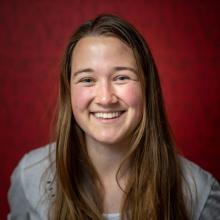Hannah Green
Why did you decide to pursue a graduate degree?
After completing my undergraduate degree in theoretical linguistics, I was excited to find an opportunity to apply my knowledge in the field, and to gain research experience to eventually be able to conduct my own research. A 2-year master's program seemed like the perfect place to do this: both to continue to learn from experienced faculty and to have the opportunity to conduct independent research in a supervised environment. In addition to my field-related aspirations, I also wanted to have the opportunity to meet like-minded individuals across many fields who are all working to support the further development of science and exploration of the arts.
Why did you decide to study at UBC?
Many things drew me to UBC for my graduate studies: the beautiful campus, the extremely diverse student and staff population, the many research and funding opportunities, and alumni testimonies. Additionally, I was drawn to the UBC linguistics department for its approach to field research and working with endangered and underrepresented languages.
What is it specifically, that your program offers, that attracted you?
UBC Linguistics is one of the leading departments in North America for balancing theoretical and field linguistics. As someone who has always been interested in working with endangered languages, I wanted to study/research somewhere that prioritizes this kind of work. The department also has many faculty who are experienced in this kind of work, meaning that it's a great environment to learn and develop research skills for the field.
What was the best surprise about UBC or life in Vancouver?
The best surprise about UBC is all of the events! There is always something happening on campus, so it's nice to be able to meet new people and to get away from academics for a while. What I love about life in Vancouver is that there is always something to do outside, whether it be a hike, a beach walk, or a short drive into the mountains.
What aspect of your graduate program do you enjoy the most or are looking forward to with the greatest curiosity?
Working with speakers of under-documented languages, and being able to participate in the documentation process.
What do you see as your biggest challenge(s) in your future career?
Lack of speakers - an unfortunate reality of working with endangered languages is that the native speaker population is ageing. This means that this kind of work is very time-sensitive.
How do you feel your program is preparing you for those challenges?
Archival training, collaborative research.
What aspects of your life or career before now have best prepared you for your UBC graduate program?
Being a residence advisor (RA) during the fourth year of my undergraduate degree best taught me how to manage a high number of commitments and time management. This has transferred over to my time at UBC: even though it's possible to have a balanced work-life schedule, it's important to have good time management and prioritize obligations and commitments.
What do you like to do for fun or relaxation?
Yoga, running, cooking, UBC boot camps, Netflix, hiking, exploring Vancouver's coffee shops, spending time with friends.
What advice do you have for new graduate students?
The beginning of graduate school can be a bit of a whirl-wind: there is a lot more responsibility and time-commitment than undergraduate studies. However, just remember that you are here for a reason: that you DESERVE to be here. Never doubt your abilities to perform in your research, and remember that there are faculty and other students who can help you if/when you need it. Most of all, remember to have a work-life balance. Nobody is expecting you to work every single day of the week! Taking the time to establish a balanced schedule can go a long way.

